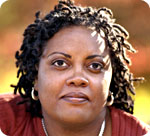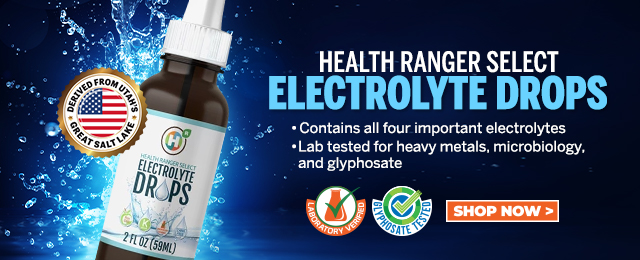
Blacks more likely to die from cancer because of vitamin D deficiency, study finally admits
Friday, June 15, 2012 by: Ethan A. Huff, staff writer
Tags: blacks, vitamin D deficiency, cancer
- Newly released JFK files reveal Pentagon's role in creating Lyme disease and covid in the same lab
- BIGGEST SCAM: You pay income tax, then taxes on purchases, then personal property tax on what you own that you already paid taxes on with taxed money
- Analysis: The coming economic collapse, a mass uprising and Trump's three secret weapons to halt the growing revolt
- American food is the MOST TOXIC “FOOD” on earth
- EXPOSED: Antifa and IRS collude to shield radical funding from taxation
- The flu vaccine paradox: Are we making things worse?
- A lack of integrity in Academia: Harvard professor found GUILTY of fraudulent research to promote CRT theory
- Big Pharma's $8 Billion bribery scheme exposed: how doctors are pushed to prescribe junk science, not heal
- Heads up! List of food shortages expected in 2025 as the campaign of forced starvation continues to be waged against the American people
- Reclaim your health: How midlife exercise reverses years of inactivity
- Trump reverses course on Gaza plan, says “nobody is expelling Palestinians”
- Florida takes a stand: DeSantis proposes permanent ban on mRNA vaccine mandates
- Beyond consequence
- 5 Simple steps to boost your brainpower: How to strengthen executive function in a distracted world
- Mike Adams Sermon 66: God will DESTROY ISRAEL for its wickedness
- OpenAI whistleblower who dissented against how the company trained ChatGPT found dead
- Elon Musk: Aliens could be here on Earth RIGHT NOW
- Boys are back in town: Trump’s patriotic alpha crew takes the wheel while toxic females ride in the backseat
- Reclaim your health: How midlife exercise reverses years of inactivity
- A lack of integrity in Academia: Harvard professor found GUILTY of fraudulent research to promote CRT theory
- Space war brewing? Russia threatens to destroy Starlink satellites
- EPA advisor admits the agency is funneling billions to climate groups ahead of Trump’s return to White House
- Elon Musk: Aliens could be here on Earth RIGHT NOW
- Big Pharma's $8 Billion bribery scheme exposed: how doctors are pushed to prescribe junk science, not heal
- Historian warns Israel may be entering an “IRREMEDIABLE DECLINE”
- Trump reverses course on Gaza plan, says “nobody is expelling Palestinians”
- Mike Adams Sermon 66: God will DESTROY ISRAEL for its wickedness
- Rep. Nancy Mace introduces bill to ban biological males from female facilities on federal property
- New York politicians push bill allowing governor to indefinitely detain the unvaccinated on a whim
- RFK Jr.'s SSRI antidepressant investigation sparks liberal meltdown, exposes Big Pharma's dangerous game
- 5 Simple steps to boost your brainpower: How to strengthen executive function in a distracted world
- Mark Zuckerberg's REAL NAME is Jacob Greenberg and he is the GRANDSON of DAVID ROCKEFELLER, hence the POWER of FAKEBOOK
- Survival 101: Effective EMF blocking techniques
- Sales of survival bunkers rise following Russia’s use of the Oreshnik hypersonic ballistic missile
- Trump Administration cuts 2,000 USAID jobs, places most employees on leave in sweeping reform effort
- Pilots report mysterious lights 'moving at extreme speeds' across Oregon skies
- EPA advisor admits the agency is funneling billions to climate groups ahead of Trump’s return to White House
- The Health Ranger releases “Vaccine Zombie” song and music video, using AI-animated zombies for the music video
- The pandemic as a tool for INDOCTRINATION: Understanding “The Indoctrinated Brain” by Dr. Michael Nehls
- California's social media censorship law struck down: A victory for free speech or a threat to online safety?
- Mike Adams releases new song and music video: Nothing More Disgusting Than a Globalist
- Congratulations to the FULLY UNVACCINATED as you resisted the COVID-19 PROPAGANDA MACHINE fueled by over $100 BILLION
- Mike Adams releases country western hit single: Goin’ Back in Time is Comin’ Home
- Dr. Mike Yeadon releases 15-minute testimony - WATCH - about genocidal intent of COVID “vaccines”
- RFK Jr. clears key hurdle: Sen. Susan Collins backs controversial HHS nominee, signaling a new era for health policy
- Mike Adams releases music poetry sensation: A Child of God
- Unpacking the Lies That We’ve Been Fed – new song and music video released by Mike Adams, the Health Ranger
- Trump administration takes on global censorship: A new frontier for free speech advocacy
- Ex-FBI Chief EXPOSES disgraceful government coverups of Oklahoma City Bombing, Kennedy assassinations, 9/11 WTC, and "Terrorism" as plot to destroy Constitution
- Federal judge backs Trump's mass firings, clearing path for government downsizing
- Florida takes a stand: DeSantis proposes permanent ban on mRNA vaccine mandates
- Michigan sheriff announces criminal investigation into 2020 election crimes, Dominion Voting Systems
- “Why we influenced the 2020 elections”: Facebook files reveal the coordinated effort to bury the Hunter Biden laptop story
- Bush tomato: A mighty superfood that supports digestive health
- Red Cross issues warning to stop blood plasma donations from vaccinated people
- Scientists confirm: GENIUS brain function can be spontaneously unleashed in humans without any apparent cause
- EPA advisor admits the agency is funneling billions to climate groups ahead of Trump’s return to White House
- HYSSOP: What research reveals about the health benefits of this ancient holy herb
- Two containers with completed ballots fall out of truck in Florida
- Fully vaccinated about to see “tsunami” of illness and death, warns virologist
- Today I asked our AI language model “Neo” about which phytonutrients or phytochemicals can block the spike protein related to SARS-CoV-2 … Here is what it answered…
- Global leaders unite to clamp down on “misinformation” with UN-backed Cascais Declaration
- BREAKING: 2025 NDAA authorizes mandatory military draft of WOMEN across America… as Pentagon pursues global NUCLEAR war with both Russia and China at the same time
- Michael Yon warns of a ZIONIST TAKEOVER in Trump’s second administration
- BOMBSHELL: DNA testing kits are a SCAM to develop ethnic-specific bioweapons
- Ozempic and Wegovy weight loss drugs are injectable LIZARD VENOM PEPTIDES that may unleash a devastating wave of organ failure… side effects align with symptoms of SNAKE BITES
- Israeli soldiers accused of even more torture and abuse in the West Bank
- These 13 countries just signed an agreement to engineer a global FAMINE by destroying food supply
- NASA admits that climate change occurs because of changes in Earth’s solar orbit, and NOT because of SUVs and fossil fuels
- RFK Jr. clears key hurdle: Sen. Susan Collins backs controversial HHS nominee, signaling a new era for health policy
- Sermon 30: How Jesus reveals Caesar’s FAKE CURRENCY and FALSE AUTHORITY
- Coriander seeds: Ancient medicine backed by modern science
Published in the journal Dermato-Endocrinology, the study sheds a little more light on the vital role vitamin D plays in disease prevention. After taking into account socioeconomic status, stage of diagnosis, treatment options, and various other factors that might affect survival rates, researchers determined that the mortality rate for cancer among African-Americans is as much as 30 percent higher than it is for others, specifically because of vitamin D deficiency.
Individuals with fair skin tones can produce an adequate amount of vitamin D from natural sunlight exposure in about 15 minutes a day during the summer. But blacks and other darker-skinned individuals require as much as six-times longer in the sun to produce the same amount, which means many darker-skinned people, especially in North America, are more prone to vitamin D deficiency than light-skinned people.
As a result, individuals of African and Middle-Eastern descent may be more prone to chronic illness, including 13 specific types of cancer identified in the study -- bladder, breast, colon, endometrial, lung, ovarian, pancreatic, prostate, rectal, testicular, vaginal, Hodgkin's lymphoma and melanoma. This is why it is important for darker-skinned people to either spend more time in the sun, whenever possible, or supplement with natural vitamin D3 every day.
"Raising vitamin D concentrations to 40 ng (nanograms) per ml (milliliter) by taking 1000-4000 IU (international units) per day of vitamin D3 supplements is the easiest thing African-Americans can do to reduce the heavy burden of cancer they experience," says William B. Grant, co-author of the new study and Director of the Sunlight, Nutrition and Health Research Center (http://www.sunarc.org).
"In addition to reducing the risk of cancer, vitamin D would also reduce the risk of cardiovascular disease, diabetes mellitus, respiratory infections and many other chronic and infectious diseases."
Vitamin D deficiency widespread
It is not just blacks that need more vitamin D, however. A 2011 study found that nearly half of the overall population is vitamin D deficient, regardless of race. The most severely affected groups, though, are blacks, more than 82 percent of which are said to be deficient, and Hispanics, more than 69 percent of which are vitamin D deficient.Opinions vary as to how much vitamin D an individual needs every day, but the growing consensus is that optimal blood serum levels of vitamin D are between 50-80 nanograms per milliliter ng/mL, or 125-200 nanomoles per liter (nmol/L). Depending on what your current serum levels are, you may need to supplement daily with anywhere from 4,000-10,000 IU or more of vitamin D3.
If you think you might be vitamin D deficient, you may want to get tested. The Vitamin D Council has created a helpful page that explains how to get tested, what to look for, and how to begin restoring optimal vitamin D levels in your body: http://www.vitamindcouncil.org
Sources for this article include:
http://zeenews.india.com
http://www.vitamindcouncil.org
http://www.vitamindcouncil.org
"http://www.ncbi.nlm.nih.gov/pubmed/21310306
Blacks at FETCH.news
Get independent news alerts on natural cures, food lab tests, cannabis medicine, science, robotics, drones, privacy and more.
Take Action: Support Natural News by linking to this article from your website
Permalink to this article:
Embed article link: (copy HTML code below):
Reprinting this article:
Non-commercial use OK, cite NaturalNews.com with clickable link.
Follow Natural News on Facebook, Twitter, Google Plus, and Pinterest
Science News & Studies
Medicine News and Information
Food News & Studies
Health News & Studies
Herbs News & Information
Pollution News & Studies
Cancer News & Studies
Climate News & Studies
Survival News & Information
Gear News & Information
News covering technology, stocks, hackers, and more



"Big Tech and mainstream media are constantly trying to silence the independent voices that dare to bring you the truth about toxic food ingredients, dangerous medications and the failed, fraudulent science of the profit-driven medical establishment.
Email is one of the best ways to make sure you stay informed, without the censorship of the tech giants (Google, Apple, Facebook, Twitter, YouTube, etc.). Stay informed and you'll even likely learn information that may help save your own life."
–The Health Ranger, Mike Adams













































